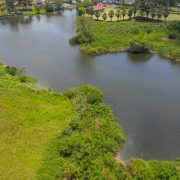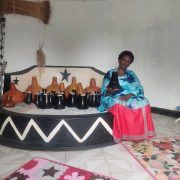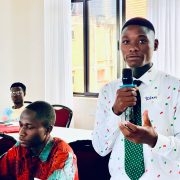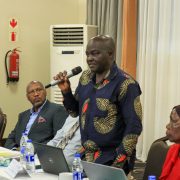Hosting chimpanzees in private forests: documenting the contribution of private forest owners in Bunyoro
- 3 years Ago
- 0 Comment
- 5 Min Read
Introduction to the research on the contribution of Private Forest Owners to Chimpanzee Conservation
CCFU has finalised a research that aimed at profiling and discussing the experiences and contribution of Private Forest Owners (PFOs) in the Bunyoro area in Uganda. It sought to define PFOs, understand their working context, delimit their contribution, understand their challenges, and suggest possible remedies to these challenges with the view of sustaining and strengthening their work. Data was collected from field visits and interviews, supplemented with secondary literature.
Since 2014, the Cross-Cultural Foundation of Uganda (CCFU) has been supported by the Arcus Foundation to conduct research and implement initiatives employing a cultural approach to the conservation of chimpanzees in Uganda, particularly in Bunyoro and Rwenzori. Over the course of our work, PFOs have been an instrumental force, particularly in regard to protecting chimpanzees outside protected areas. However, a challenge to working with PFOs has been that their work is insufficiently profiled and, therefore, their contribution largely unrecognised. This limited understanding of their work undermines the possibilities of sustaining their work through support from the public, cultural institutions, the civil society, and the State.
Key findings of the research
Part of the current study’s agenda was to identify in specific terms what PFOs contribute to chimpanzee conservation. An obvious answer to this is that they own and manage forests and thereby provide food, water, and shelter for the animals. The PFOs, however, go beyond this. Many are engaged in actively monitoring the welfare of the chimpanzees in and beyond their forests, and reporting to the authorities in case danger to the animals (or people in relation to animals) is detected.
The PFOs also conduct sensitisation through informal and formal means – some move door to door, others at public functions, others in regular conversations. PFOs are also engaged in policy and other advocacy activities. They lodge campaigns calling for actions such as the promulgation of local government ordinances pertaining to environment protection, and form pressure groups to cause or halt development that destroy the environment. Many are part of the “Save Bugoma Forest Campaign”, which aims at sustaining the forest and the wildlife therein.
The need for mitigating the challenges faced by PFOs in sustaining forests and conserving the chimpanzee cannot be overstated. Drawing on indigenous knowledge and invoking cultural reasons for conservation can mitigate some of the challenges relating to a dwindling motivation for conservation; and fill some gaps in expertise regarding forest maintenance and animal behaviour.
Relatedly, mechanisms for transmitting across generations the indigenous knowledge related to conservation need to be devised as sustaining these efforts is contingent on the involvement and understanding of young people. Whereas some PFOs are already organised in associations, further unionisation would serve to strengthen their advocacy voice and collective bargaining power for the support they might require from different stakeholders including State and non-State agencies. Attracting such support requires that the experiences and contribution of the PFOs are well understood by the public and institutions. This necessitates the involvement of the media and studies such as the one reported in this publication.
Chimpanzee conservation challenges in the Bunyoro area
The habitat and livelihood for the chimpanzee (Pan Troglodytes Schweinfurthii) in the Northern Albertine rift in Uganda, particularly in the Bunyoro area, is fast disappearing with the loss of forest cover at 5.1% per annum, higher than double the national average of 2.1%. The chimpanzee population estimated between 300 and 500 in the community and private areas require more than the State Protected Areas in the Bugoma-Budongo landscape.
Firstly, sections of the protected areas are quite significantly degraded and cannot provide the food and water resources needed by the chimpanzee population.
Secondly, the protected areas are disjointed, which means that chimpanzees and other wildlife transiting between them become susceptible to challenges such as human harassment and poaching. The presence of forest patches between and beyond these protected areas is, therefore, of significant value as they provide habitat, food, and water for the chimpanzees. Many of these forest patches are owned and managed by private forest owners (PFOs).
Background to CCFU’s (#CultureForChimps) project on using cultural and community resources to conserve chimpanzees in Bunyoro and Rwenzori regions
Since 2014, CCFU implement interventions drawing on indigenous cultures to advance the conservation of chimpanzees (Pan Troglodytes Schweinfurthii) in Uganda, particularly in the Bunyoro and Rwenzori subregions. CCFU interventions target cultural institutions, clans (particularly the Bayanja and Batangyi), private forest owners, community based organisations, youth, as well as other stakeholders whose practices and experiences contribute to the conservation of chimpanzees and forests in Bunyoro and Rwenzori.
Our approach is premised on the conviction that drawing on community-based resources and worldviews can be a strong strategy for sustaining development efforts geared towards conservation, which has become increasingly clear over the course of our work in these regions.
For more information about this work, visit this pagehttps://crossculturalfoundation.or.ug/ccfu/2022/10/05/hosting-chimpanzees-in-private-forests-documenting-the-contribution-of-private-forest-owners-in-bunyoro/







